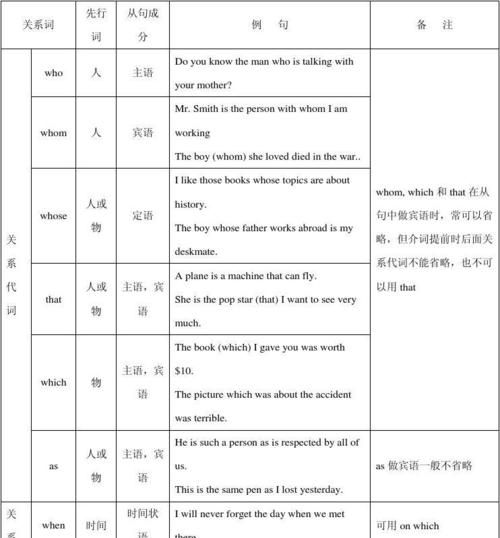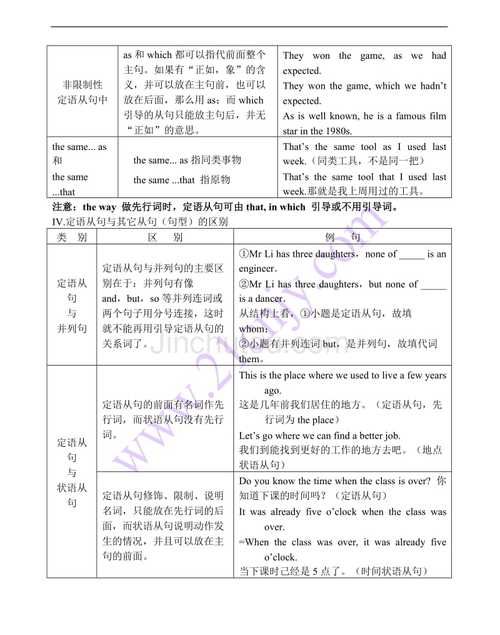本文目录
语文定语从句的几种类型
定语从句的类型
(一) 由 who,whom,whose引导的定语从句
e.g.The student who answered the question was Jack
(二) 由which引导的定语从句
1) which在从句中作主语或谓语动词的宾语。
e.g.:I found a door which was unlocked.
Where is the book I bought yesterday?
2) which(whom)在从句中作介词的宾语时,介词一般可放在which(whom)之前,也可放在从句原来的位置上,在含有介词的动词固定词组中介词只能放在原来的位置上,而不能放在which(whom)之前。
e.g.:Please tell me from whom you borrowed the English novel. (=Please tell me whom you borrowed the English novel from.)This is the magazine which you are looking for. (look for是固定词组)
(三) 由that引导的定语从句在这种定语从句中that可以指人或物,代替who,whom,which,在从句中作主语或谓语动词的宾语(不能放在介词后面作介词宾语)。
e.g.:Would you like to have lunch at a new restaurant I heard about? (that可省略)但下列两种情况只能用that
1) 序数词或最高级形容词修饰先行词时,要用that. e.g.:The first English novel that I read was A Tale of Two Cities by Charles Dickens.
2) all, everything, nothing, something, anything等不定代词作先行词时,要用that。e.g.:Everything that we saw at the Industrial Exhibition greatly interested us.
(四) 由when, where, why引导的定语从句
I will never forget the day when I arrived in London.
. (五) 限制性定语从句和非限制性定语从句限制性定语从句是句中不可缺少的组成部分,如果没有从句,先行词的意思就不明确,主句也不完整,从句和主句之间一般不用逗号分开。
非限制性定语从句是主句先行词的补充说明,没有从句并不影响主句意思的明确或完整,这种定语从句一般用逗号与主句分开。在非限制性定语从句中通常不用关系代词that。
e.g:He once bought a railway ticket for a woman, which was reported in the newspapers.(which代表主句所述事实)
定语从句教案
教学目标
1. 知识目标:掌握下列重点单词和词组的.意思及用法ache, evercise, weight, give up, interest及其词汇转化
2. 能力目标:能够询问有关健康的信息,表达态度,提供建议。学习使用由whose引导的定语从句。
3.情感目标:通过了解tony 的经历,培养体谅、关爱他人的情感态度。
教学重难点
1.重点:对话中的句型应用,由whose引导的定语从句
2.难点:由whose引导的定语从句的运用。
教学工具
课件
教学过程
[课前朗读]: 朗读生词ache, exercise, weight, give up, interest, tasty----taste, menu, persuade.根据音标读出单词并了解汉语意思,养成学生自主学习词汇的习惯,促使学生迅速进入学习状态。
[检查词汇预习]:
a.采取学生结对、小组互查等形式来检查学生对词汇的预习情况。
b.朗读单词,注意发音。
一、情境导入
教师可问学生:(1)What’s your favourite sport?(2) How do you think we can keep fit?(3) Have you ever remembered what happened to Tony in Module9?这样会调动学生用英语思维的积极性, 引出本单元话题。
二、小听力(自主完成,合作释疑)
听Activity 2,完成表格
Betty
Lingling
Taijiquan
Weight
training
Running
针对表格进行说的练习。如:How does Lingling think of Taijiquan and running?
三、大听力 多层听
1.听Activity 3,完成下列各题。
1).Who has Betty bumped into?
A. The head teacher B. The English teacher C.Lingling and Betty
2).Does Daming think that the boy in his team can go to a sports school ?
A. Yes, he does B. No, he doesn’t C. We don’t know
3).What does Daming want the head teacher to write ?
A. Something about staying healthy
B. Something about training for the Olympics
C. something about buying a camera
2. 再听Activity 3,完成下列表格。
1. How did Tony feel
the basketball training? 1. He feels very
2. What will the boy in Daming’s team need to do? 2. He needs to do a lot of___ _____
3. Why isn’t allowed to use his father’s camera any more? 3. Because he almost __ ______ it last time.
四、默读对话,自主完成Activity 4.
完成后小组展示并纠正。小组间合作解决activity 3中不懂的地方,教师适时点拨。
五、突破重点与难点
对重点内容和疑难问题进行合作探究学习。
1.My legs ache a bit. ___________________(翻译)
(1) a bit 译为_____________. 其同义短语是___________.
自主造句:_______________________________.
2. Don’t give up if you want to stay fit.__________________________.
give up, 放弃。其中up是代词,后跟名词作宾语时可放在短语 ,也可放在 ,而跟代词宾语时只能放 。例如:give it/them up放弃做某事----give up doing sth.
自主造句: _______________________.
我们学过的可加动名词的动词或短语有
3.He is not fit or strong enough.____________________________
总结enough 的用法并举例
自主造句:
4. I’ve got a friend whose brother is training for the Olympics.此句含有一个whose 引导的定语从句,whose在从句中作定语,又如:
He is the only student in our class whose father is a policeman.
There is a boy whose parents want him to go to a sports school.
先行词为无生命的物体时也可以用whose 引导定语从句.如:
The book whose cover is green is mine.
No one now lives in the room whose windows are broken.
5.找出含有whose 的定语从句并翻译句子。分析定语从句的先行词。
___________________________________________________.
___________________________________________________.
___________________________________________________.
___________________________________________________.
5. 自主补充完善
六、归纳短语
通过对对话的学习,让学生归纳本课的短语,可以小组合作,然后通过展示呈现出一个小组的成果,然后其他小组补充完善。
1. _____________________ 9._______________________
2. _____________________ 10.______________________
3. _____________________ ______________________
4. _____________________ _______________________
5. _____________________ ______________________
6. _____________________ ______________________
7. _____________________ ______________________
8. _____________________ ______________________
七、诵读积累
(一)跟录音机朗读对话,模仿语音语调。
(二)读熟对话
(三)读烂短语
(四)读烂下列重点句子
1.Don’t give up if you want to stay fit.
2. He isn’t fit or strong enough.
3.I’m not allowed to use it any more.
4.It’s my father who gives me my pocket money.
5. Don’t talk to me about that.
6. What’s up?
7.Guess what?
8. (含有whose的定语从句)
八、说的训练:
Work in pairs. Ask and answer the questions in Activity 5.
九、当堂检测
(一)翻译下列短语及句子:
1.放弃___________________2.一点_____________________________
3.保持健康 _______________ 4.足够强壮_________________
5.碰巧遇到_________________6.发生什么事了?_________________
7.看起来像 ________________ 8.祝你好运 ________________

定语从句的分类及例句
2种.限制性和非限制性定语从句
1、 定语从句在句中修饰某个名词或代词,被定语从句修饰的词叫先行词.定语从句需用下列关联词:
关系代词 关系副词
起连词作用,本身做从句的主语、宾语、表语或定语 起连词作用,本身在从句中作时间、地点或原因状语
who,whom,that,whose,which,as when,where,why
2、 掌握以上关系代词、关系副词的含义及使用时,要特别注意以下几点:
1) 指人时宜用who 的情况:
a.当先行词是 one,ones,anyone 或 those 时,关系代词用 who.
Anyone who goes there will be punished.
b.在there be 开头的句子中.
There’s a beautiful girl who came to see you this morning.
c.先行词后有一个较长的定语.
I met a foreigner in the city last week who could speak Chinese well.
d.在非限定性定语从句中.
She has a brother,who worked at that factory ten years ago.
2) 指物时宜用 that 的情况:
a.当先行词为 all,much,little,few,none,something,anything,everything,nothing 等不定代词时.All that can be done has been done.
b.当先行词既指人又指物时.
He spoke of the men and the thing (that) he had seen abroad.
c.当先行词被序数词或形容词的最高级修饰时.
This is one of the best films that I have ever seen.
d.当先行词被 the very,the only,the last,any,every 等修饰时.
This is one of the very book that I am looking for.
e.当先行词是疑问词 who,what,which 时.
Who that has such a home doesn’t love it?
f.关系代词在从句中作表语.
Mary is no longer the girl that she used to be.
3) 只能用 which 不能用 that 的情况.
a.引导非限定性定语从句修饰某物或整个句子.
Bruce went towards the fire,which was still smoking.
Tom came back late,which made his parents very angry.
b.关系代词作介词的宾语.This is the house in which Lu Xun once lived.
4) 关系代词 as 和which都能引导非限定性定语从句代表整个句子的内容,as
引导的从句可位于句首或句末,which引导的定语从句则不能位于句首.
Which you know,he is a good man.(×)
As you know,he is a good man.(√)
6)关系副词when,where,why其含义相当于on which,in which for which等,可以互换:
The day when /on which I met him first was May 1st.
I don’t know the reason why /for which he didn’t come.
7)whose指物时,可以与of which等结构互换,但应注意与冠词的位置关系:
This is the book the cover of which / of which the cover / whose cover is blue.
8)有时可用代替关系副词.在口语中常省略.
This is the reason (why / for which / that) he came late.
9)先行词是专有名词、整个句子或世界上独一无二的物质名词时,一般用非限定性定语从句修饰.The sun,which gives us light and heat,is very big.
10)在先行词和定语从句之间有无逗号有时会引起名义的变化:
He said nothing that made her angry.他没说使她生气的话.
He said nothing,which made her angry.他一言不发,这使她很生气.
3、 定语从句与强调结构
It is the place where they lived before.
It is in the place that they lived before.
第一个句子为定语从句,where指代the place,在定语从句中作状语,第二个句子为强调结构,强调in the place,that没有意义,把放回后面句子,句子意思完整.
Where is it that he found the lost watch?(强调句型,强调疑问副词where.)
Where is the watch he found yesterday?(定语从句,that指代the watch.)
4、 定语从句中的先行词
Is this book the one that you bought yesterday?
Is this the book that you bought yesterday?
第一个句子中,this book是主句的主语,the one是先行词.在第二个句子中this是主句的主语,the book是先行词.一定要避免出现:Is this book that you bought yesterday?
5、 定语从句与同位语从句
定语从句相当于形容词,它对先行词起修饰、描述或限制作用,而同位语从句则相当于名词,对其前面的词给予说明或作进一步解释,即说明该词所表示的具体内容.例如:
The news that we heard is not true.(定语从句)
The news that he won the prize is not true.(同位语从句)
另:在“have no idea +从句”结构中,其从句都作idea的同位语.例如:
I have no idea when she will be back.

定语从句举例子
定语从句举例:
1、你昨天错过的会议非常重要。
The meeting that you have missed yesterday was very important.
2、正在做演讲的女孩是我们班的班长。
The girl who is making a speech right now is our monitor.
3、我昨天打坏的花瓶是很昂贵的。
The vase that I broke yesterday was very expensive.
4、昨天帮助了你的男孩是我的邻居。
The boy who helped you yesterday is my neighbour.
5、这正是我所感兴趣的话题。
That's just the topic that I'm very interested in.

6、这是那个给我提供了宝贵机会的老板。
He is just the boss who gave me that valueable opportunity.
7、这个话题是我感到厌倦的。
This is the topic/theme that I'm tired of.
8、他是那个帮助了我的老师。
He is the teacher who helped me.
9、我们很喜欢那个很幽默的演讲者。
We all like that speaker who is very humourous.
英语的定语从句分析及详解
定语从句,一个简单句跟在一名词或代词后(先行词)进行修饰限定,就叫做定语从句。
英语定语从句例子一
1.The Chinese knots ,which I made by myself with red silk thread and other material, look really beautiful in the shape of diamond. (2013年广西卷)
2. I will organize some campus activities, like “English Evening”, a platform where students can show their English (2013年天津卷)
3.I read the announcement of the summer camp that you have posted on the Internet and I am interested in it. (2012全国卷)
4. In the English corner, I meet many friends, who share the same interest with me. (2012·全国卷Ⅱ)
5. My physics teacher is my role model, whose influence on me had a lot to do with my decision.(2012安徽卷)
6. To avoid such conflicts, we should be kind to one another, which is essential to enjoy a harmonious life. (2012江苏)
7. As we know, books are the source of knowledge. (2012·湖北)
8. Dear friends , please actively take part in after-class activities , which will not only make your school life colorful , but also improve your learning.(2011四川卷)
9. I have taken with me the two books (that) you asked me to return to the City Library. (2009全国I)
10.The reason why we have to grow trees is that they supply us fresh air.
11. I always miss the days when we were on the summer camp last year.
12. It's time to recall those beautiful days we spend together. (2007年湖南卷)
英语定语从句例子二
1.He,who knows nothing but pretends to know
everything,is indeed a good-for-nothing.
不懂装懂,永世饭桶.
2.He that is ill to himself will be good to nobody.
人不自爱,焉能爱人?
3.He laughs best who laughs last.
谁笑在最后,谁笑得最好.
4.He who makes no mistakes makes nothing.
从不犯错误的人一事无成.
5.He that can read and meditate will not find
his evenings long or life tedious.
会读书思索的人不会感到长夜无聊或生活乏味.
6.He that gains time gains all things.
谁赢得时间,谁就赢得一切.
7.He is the best general who makes the fewest
mistakes.—Hamilton
错误犯得最少的将军就是最好的将军.——汉密尔顿
8.He who nothing questions,nothing learns.
什么也不问的人什么也学不到.
9.He that is master of himself will soon be
master of others.
能自制者方能制人.
10.He that travels far knows much.
行万里者,见多识广.
11.He that cannot ask cannot live.
万事不求人,哪里能生存?
12.A friend is someone who knows all about
you and still loves you.
英语定语从句例子三
朋友就是这样的人——他了解你的一切而仍然喜欢你.
【 并列式定语从句 】 (1) The owner of the housewhosewife is dead,whoseson works in New Yorkandwhowants to go and live with him, is willing to sell the house at a low price. 这幢房子主人的妻子已过世,儿子在纽约工作,他想搬去和儿子一起生活,所以愿意以低价出售此房。
(2) Mr. Smith,whohas a good command of French and Englishbutwhodoesn’t know Chinese, finds it difficult to study Chinese literature. 史密斯先生精通法语和英语,但对中文则一无所知,所以他发现研究中国文学很困难。
(3) This is the house inwhichthe famous man lived,whichyou visited 10 years agoandwhichbecomes a museum now. 这就是那位名人居住过的房子,10年前你参观过,现在成了博物馆。
【 复合式定语从句 】 (1) She had a bookwhichshe believed was bought by her father at a dear price. 她有一本父亲送她的书,她相信是父亲花了大价钱专门买来送她的。
(2) She has an adopted childwhoshe says was an orphan. 她有一个养子,据她所言,这个孩子以前是个孤儿。
(3) Can you mention anyonethatwe know who is so talented as he? 在我们认识的人中,你说还有谁像他一样有才华?
(4) She is the only girlthatI knowwhocan play the guitar. 她是我所认识的唯一会弹吉他的.女孩。
(5) Is there anything else (that) you'd like (that) you don't see on the shelves? 有没有别的你喜欢的东西,现在架子上还没有?
▲此外,你说的 high in fat,意为“在脂肪方面含量高”。例如:
Ice cream is high in fat and sugar. 冰激凌的脂肪和糖分含量很高。
A diet high in fat may lead to obesity.一个人的饮食含脂肪过多会导致肥胖。
Eating too much food which is high in fat and sugar will result in heart illness.吃过多高脂肪和高糖类的食物会导致心脏疾病。

以上就是关于定语从句类型及例子 ,语文定语从句的几种类型的全部内容,以及定语从句类型及例子 的相关内容,希望能够帮到您。

